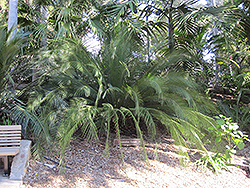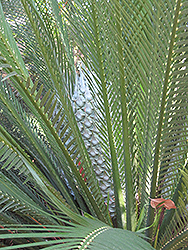It's all about ...
plants

Height: 12 feet
Spread: 15 feet
Sunlight:
![]()
![]()
Hardiness Zone: 8b
Other Names: New South Wales Macrozamia
Description:
A large, palm-like cycad featuring numerous, long, arching pinnate leaves that are graceful in form and texture, rising above a stout trunk; highly adaptable, cold and drought tolerant; an impressive landscape accent
Ornamental Features
Johnson's Cycad is primarily valued in the landscape or garden for its ornamental globe-shaped form. It has attractive bluish-green evergreen foliage. The large narrow pinnately compound leaves are highly ornamental and remain bluish-green throughout the winter. The white fruits are held in cones from early spring to early summer.
Landscape Attributes
Johnson's Cycad is a multi-stemmed evergreen shrub with a more or less rounded form. It lends an extremely fine and delicate texture to the landscape composition which can make it a great accent feature on this basis alone.
This shrub will require occasional maintenance and upkeep, and should not require much pruning, except when necessary, such as to remove dieback. It is a good choice for attracting bees and butterflies to your yard, but is not particularly attractive to deer who tend to leave it alone in favor of tastier treats. Gardeners should be aware of the following characteristic(s) that may warrant special consideration;
- Spiny
Johnson's Cycad is recommended for the following landscape applications;
- Accent
- Rock/Alpine Gardens
- General Garden Use
Planting & Growing
Johnson's Cycad will grow to be about 12 feet tall at maturity, with a spread of 15 feet. It has a low canopy with a typical clearance of 1 foot from the ground, and is suitable for planting under power lines. It grows at a slow rate, and under ideal conditions can be expected to live to a ripe old age of 120 years or more; think of this as a heritage shrub for future generations!
This shrub does best in full sun to partial shade. It is very adaptable to both dry and moist growing conditions, but will not tolerate any standing water. It is not particular as to soil pH, but grows best in sandy soils. It is somewhat tolerant of urban pollution. This species is not originally from North America, and parts of it are known to be toxic to humans and animals, so care should be exercised in planting it around children and pets.
This plant is not reliably hardy in our region, and certain restrictions may apply; contact the store for more information.

